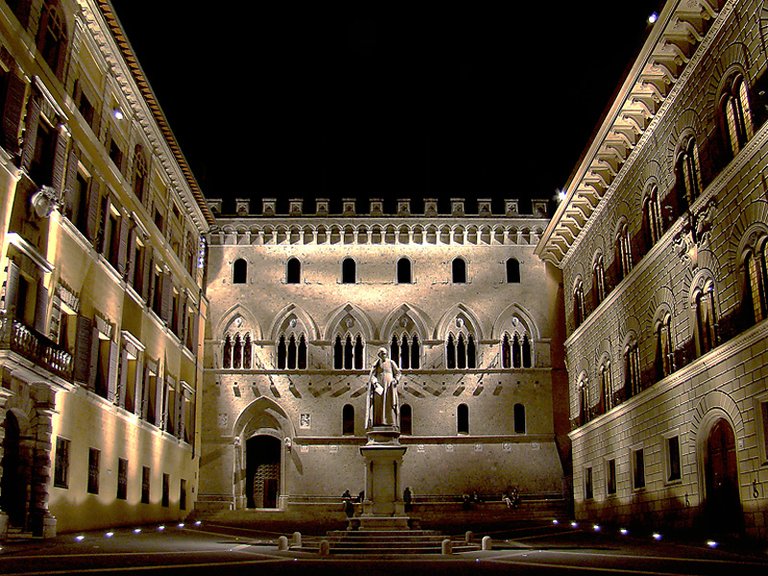Good morning Steemians,
We have always been amazed that when a bank fails, our deposits over the national protection limit (if our country has this scheme in place) will legally be taken and used to bail in the bank, but any loans we have with the same bank still need to be paid back by us.

Image Source: Wikimedia Commons
Monte dei Paschi, Italy’s third largest bank and the oldest bank in the world is in serious trouble due in part to non-performing loans.
Non-performing in this case is a nice way of saying “bad debts or at risk of default”.
Should the bank fail to raise the capital it needs to avoid collapse, through its own faltering rescue plan, it will probably be seeking a rescue from the Italian government. This would require the Italian government raising its debt levels to facilitate this rescue and that of other “at risk” Italian banks.
This looks like an insolvent government having to bail out insolvent banks – the world of high finance has obviously lost all common sense.
Monte dei Paschi has successfully taken out a 4.7 billion euro bridge loan which it needs to securitise aka repackage as debt securities, and sell these non-performing loans to third party investors.
This sounds very similar to the MBS (mortgage backed securities) of 2007/08. Clearly the banks are still carrying out this practice perhaps in addition to MBS.
By selling an “at risk of default” loan in the form of a bond to an unsuspecting third party investor, they are transferring that risk of default to the third party investor, but you are still liable to repay that loan.
Why an investor would buy these repackaged bad loans is beyond us, perhaps they don’t realise what they are.
When a bank fails, one would assume that all the remaining “good loans” are securitised in the same manner and sold off. By using this practise of debt securitisation, any loans made by a bank to an individual or company will always be due for repayment, whether the loan is defaulted on or not, the bank doesn’t lose out.
When we deposit money into our bank account, we become a creditor of that bank, so if it fails our name goes onto a long list, along with all the other creditors of that bank. Unfortunately, we are possibly somewhere near the bottom of the list so it is very unlikely we will receive our money after the whole legal process is completed.
To ensure our deposits are totally out of our reach following a bank failure, bail in clauses now form part of most banking terms and conditions.
We’ll never change the banks behaviour or questionable practices, but collectively we can stop borrowing money we don’t have, to buy things we don’t need.
Any savings we have over the national protection limits can be withdrawn and put into physical gold, silver or alternative forms of currency to protect it from legalised theft amongst other things.
Take control of your future, it's never too late to start and you won't regret it.